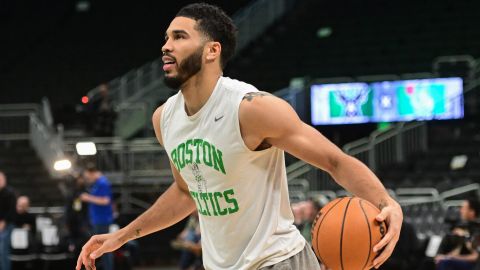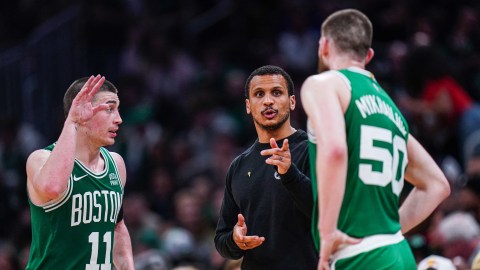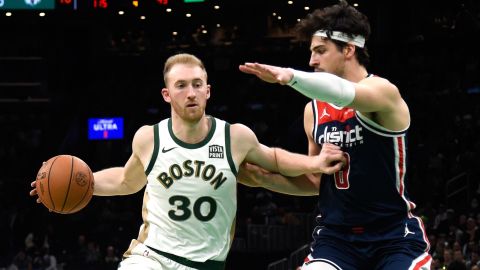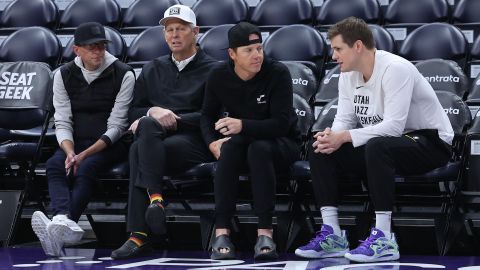 Brad Stevens, usually confident and well-spoken, hesitated. Asked to grade his own performance in Year 1, the Boston Celtics coach uncharacteristically tripped over his words.
Brad Stevens, usually confident and well-spoken, hesitated. Asked to grade his own performance in Year 1, the Boston Celtics coach uncharacteristically tripped over his words.
“I would say — I thought I did — um, ‘incomplete.’ ” he stammered.
Promising that he would be his own harshest critic, Stevens found it hard to be very complimentary of his performance in his first season on an NBA bench. The 25-57 record spoke for itself, although from the front office to the locker room, praise was more forthcoming.
“I think Brad did a great job,” said Danny Ainge, the team’s president of basketball operations. “He’s a special person and a great coach. The players see it. They see his work ethic, his integrity, his intelligence. He earned the respect of the team in a really difficult situation this year. I know he’s going to get better. He’ll be better this year and he’ll be better the year after that. He’s a sponge, and I couldn’t be happier.”
Forward Brandon Bass, who spread the gospel of Stevens as passionately as any player through his words and actions, offered another glowing review before bidding farewell for the summer after Wednesday’s season finale.
“I think he’s a great coach, to be honest,” Bass said. “This is just his first year, but I feel like, if you’re great on one level, you can be great on the next level with work ethic and time. That’s what I think all the guys gravitated to.”
To be sure, there were encouraging signs that the Celtics made the right hire last summer. The players didn’t mutiny, which counts for something, and Stevens scored points with Boston fans by making his team watch video tributes to Paul Pierce, Kevin Garnett and Doc Rivers upon the three legends’ returns to TD Garden. When the team executed on the floor — which, admittedly, was not often — they flashed some creative offensive sets that would have created easy baskets for a healthier and more skilled squad.
Still, the team finished tied for the fourth-worst record in the league. Even with longtime NBA assistant coach Ron Adams by his side, Stevens took about a month to learn the rhythm of the pro game, with it was a longer game clock, shorter shot clock and numerous TV timeouts. He discovered he had far less time to analyze previous games and prepare for upcoming games, and that practice time was scarce.
Most of all, after 13 years of virtually uninterrupted success at Butler, Stevens endured lots and lots of losing.
“It wasn’t tougher than I bargained for, necessarily, but it’s been tough,” he said. “It just never stops. It’s always coming at you. It’s always, ‘What’s next?’ You lose a close game that you think you could’ve pulled out and then, right away, you play five straight playoff teams or a team that’s not a great matchup for you. Maybe you play without one of your better players — or two or three of your better players. You always have to be focused on what you can control. You have to be great, from the start, as far as getting what you want accomplished.”
While he grew a few more gray hairs, Stevens maintained a relatively steady demeanor. There were some games after which he looked defeated, but the next day he would claim to have seen promising signs on the game tape and would hop into practice with vigor.
“I think the best thing I learned is that it’s not fun to not win, but it doesn’t define who you are and how you go about your business,” Stevens said. “One of the things that I’m probably most happy about with our team is that they didn’t change who they were. They didn’t let this losing or multiple losses affect their approach. I hope that I was the same way.”
Ainge never endured a season like Stevens had as a coach. In his three-plus seasons on the bench in Phoenix, the Suns made three consecutive playoff appearances, yet in some ways, Ainge’s coaching tenure was rockier than Stevens’. Robert Horry threw a towel at Ainge during a game in his first season, and Ainge eventually resigned 20 games into the 1999-2000 campaign to spend more time with his family.
In other words, Ainge understands that Stevens faced challenges, and in looking back on Year 1, Ainge is grading on a curve.
“Brad is a lot smarter than I am at coaching, and he has a lot more experience than I did,” Ainge said. “I know my first year of coaching, I took away that I need to simplify the game rather than trying to do too much. I think Brad figured that out over the course of this year.
“I have no worries about Brad. Brad is, maybe, the only thing right now in our whole organization I’m not concerned about.”
Photo via Facebook/Boston Celtics



